Article-at-a-Glance (Best Moving Companies 2026)
- International Van Lines tops our 2026 moving company list with its transparent pricing, full-value protection, and real-time GPS tracking for stress-free relocations.
- The moving industry remains largely unregulated in 2026, making it crucial to verify USDOT numbers, check customer reviews, and understand estimate types before hiring.
- Avoid “rogue movers” by watching for red flags like large cash deposits, suspiciously low quotes, and refusal to provide written estimates.
- Strategic timing and proper preparation can save homeowners 20-30% on moving costs without sacrificing service quality.
- Moving.com Network offers a free, no-obligation tool to compare quotes from multiple vetted movers in your area with just your ZIP code.

“Best Moving Companies in Coral Springs …” from internationalvanlines.com and used with no modifications.
How to Choose a Legit Moving Company Near You in 2026
Before requesting quotes or scheduling estimates, take these critical steps to verify any moving company you’re considering. These fundamental checks will help you eliminate unscrupulous operators before they have a chance to impact your move.
Verify USDOT & FMCSA Licenses
All interstate moving companies must register with the Federal Motor Carrier Safety Administration (FMCSA) and obtain a USDOT number. This unique identifier allows you to check a company’s safety record, insurance status, and complaint history through the FMCSA’s Safer Web system. Even if you’re planning a local move, companies that operate across state lines must maintain these credentials.
Visit https://safer.fmcsa.dot.gov and enter the company’s USDOT number to verify their status. Look for an “Active” operating status and check their safety record for red flags like frequent violations. Be wary of any company that claims they don’t need a USDOT number for interstate moves or refuses to provide their registration information.
For purely local moves, requirements vary by state and sometimes by municipality. Contact your state’s transportation department or public utilities commission to verify what licenses are required for movers in your area. Legitimate companies will happily provide proof of all required local credentials.
Additionally, if you’re looking for financial assistance, you might want to explore student loan forgiveness programs that could help ease your moving expenses.
What Real Customer Reviews Tell You
Customer reviews provide crucial insights into a moving company’s actual performance beyond their marketing claims. Read reviews across multiple platforms including Google Business, Yelp, the Better Business Bureau, and specialized sites like Move.org. Look beyond the overall star ratings and focus on the specific experiences described by customers, particularly those with moves similar to yours.
Pay special attention to patterns in customer feedback rather than isolated incidents. Multiple mentions of similar issues like unexpected price increases, late arrivals, damaged items, or poor communication indicate systemic problems rather than one-off mistakes. Conversely, consistent praise for specific aspects of service suggests genuine strengths.
Don’t just rely on testimonials featured on the company’s website, as these are naturally selected to present the business in the best light. Cross-reference reviews from multiple sources to get a comprehensive picture of the company’s performance record.
Understanding Different Estimate Types
The type of estimate you receive directly impacts your final moving cost, and understanding these differences is crucial for budgeting. Moving companies typically offer three main types of estimates, each with different implications for your wallet.
Binding estimates guarantee your final price won’t exceed the quoted amount, regardless of the actual weight or time required, providing maximum budget certainty. Non-binding estimates are based on the company’s assessment of your move but can increase substantially if your actual items weigh more or the move takes longer than initially estimated, making them risky for budget-conscious consumers.
The most consumer-friendly option is the binding not-to-exceed estimate (also called a guaranteed price or price ceiling). With this arrangement, you’ll pay the estimated amount or less if the actual weight is lower than expected, but never more—even if your belongings weigh more than estimated. Always clarify which type of estimate you’re receiving before signing any agreement.
The Value of In-Home Estimates
While online quote forms and phone estimates are convenient, they rarely provide accurate pricing for your specific moving needs. Professional moving companies should offer either in-home visits or detailed virtual surveys using video technology to assess your belongings properly. These comprehensive assessments allow estimators to account for all items, identify potential challenges like narrow stairways or elevator access, and provide more accurate quotes.
During these assessments, professional estimators will inventory major furniture pieces, ask about specialty items requiring special handling, and evaluate packing needs. This detailed approach minimizes surprises on moving day and results in more accurate pricing. Be suspicious of companies unwilling to conduct thorough assessments before providing quotes, as they’re likely to adjust prices significantly later.
Always obtain estimates from at least three different moving companies to compare pricing, services, and professionalism. These multiple assessments not only help you find the best value but also reveal how different companies approach your specific moving challenges.
Top Moving Companies (Best Moving Companies 2026)
After extensive research and analysis, we’ve identified the seven most reliable moving companies. Each company has been verified for proper licensing, insurance coverage, and consistent customer satisfaction across multiple review platforms. Our rankings consider factors including pricing transparency, nationwide availability, claims handling processes, and service quality.
International Van Lines — Best Overall
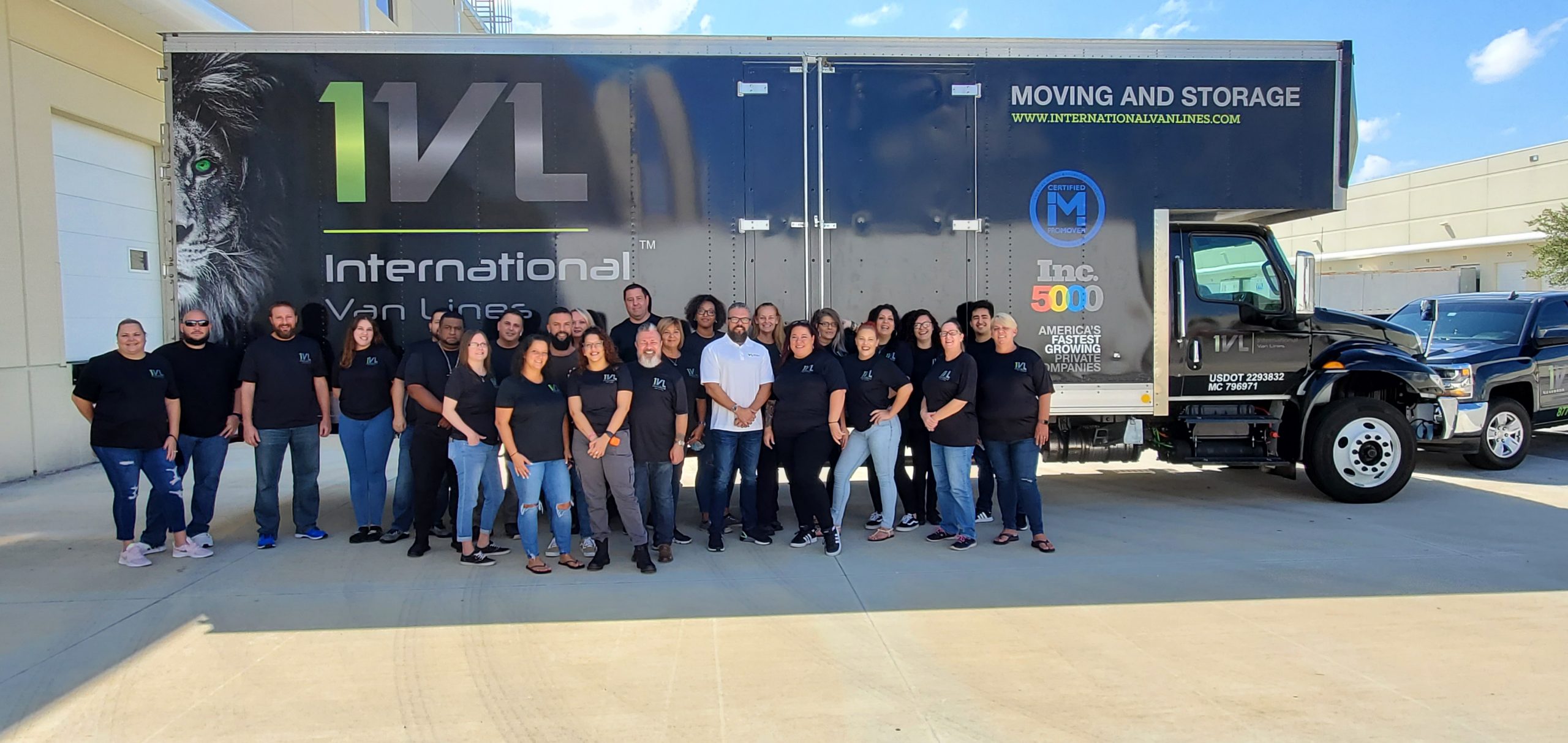
“International Van Lines in action …” from internationalvanlines.com and used with no modifications.
International Van Lines consistently outperforms competitors with its exceptional service transparency and reliability. Operating nationwide with a fleet of well-maintained vehicles, they specialize in both local and long-distance relocations with particular expertise in interstate moves. Their pricing structure features binding not-to-exceed estimates as standard practice, eliminating the common industry problem of unexpected price increases on moving day.
What truly distinguishes International Van Lines is their comprehensive approach to customer service. Each client receives a dedicated move coordinator who serves as a single point of contact throughout the entire process. They provide real-time GPS tracking for all shipments, allowing customers to monitor their belongings’ location throughout transit. Their full-value protection insurance comes standard rather than as an expensive add-on, and they maintain a remarkably low damage claim rate of under 0.5%.
For a typical two-bedroom home moving cross-country (approximately 1,200 miles), expect costs between $4,200-$5,800 depending on specific services required. Local moves are priced hourly, typically between $150-$250 per hour for a three-person crew. While not the least expensive option, their pricing reflects their premium service level and comprehensive protection offerings.
If you’re interested in exploring other financial services, you might want to consider the best credit repair services near you.
American Van Lines — Best for Long-Distance Moves
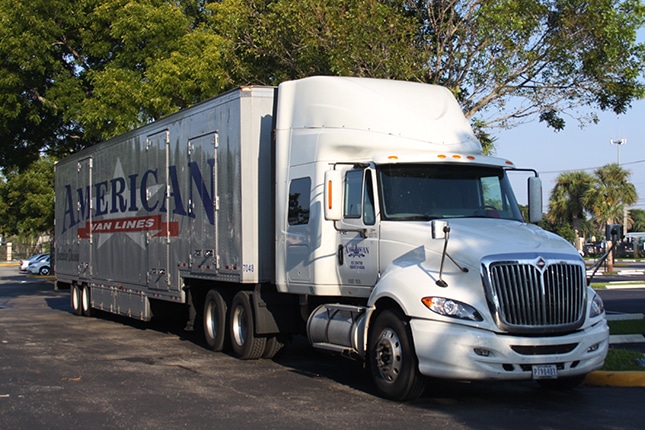
“Long Distance Movers | American Van …” from www.americanvanlines.com and used with no modifications.
American Van Lines has built a stellar reputation for handling complex long-distance relocations with precision and reliability. Unlike many competitors who broker moves to third parties, American exclusively uses their own trained crews who undergo a rigorous 48-hour hands-on training program before ever handling a customer’s belongings. This direct control over their workforce ensures consistent quality across all locations and moves.
Their flat-rate pricing model deserves special mention as it eliminates the fuel surcharges, weight adjustment fees, and unexpected costs that plague many interstate moves. When American Van Lines quotes $5,400 for your Portland to Miami move, that’s precisely what you’ll pay regardless of fuel price fluctuations or traffic delays. This predictability makes them particularly valuable for budget-conscious consumers planning cross-country relocations.
Beyond standard moving services, American offers specialized handling for high-value items including pianos, antiques, and artwork. Their climate-controlled storage facilities in major metropolitan areas provide flexible options for customers with timing gaps between properties. While their services come at a premium compared to budget alternatives, their 96% on-time delivery rate and comprehensive valuation coverage justify the investment for valuable household goods.
Allied Van Lines — Best Nationwide Network
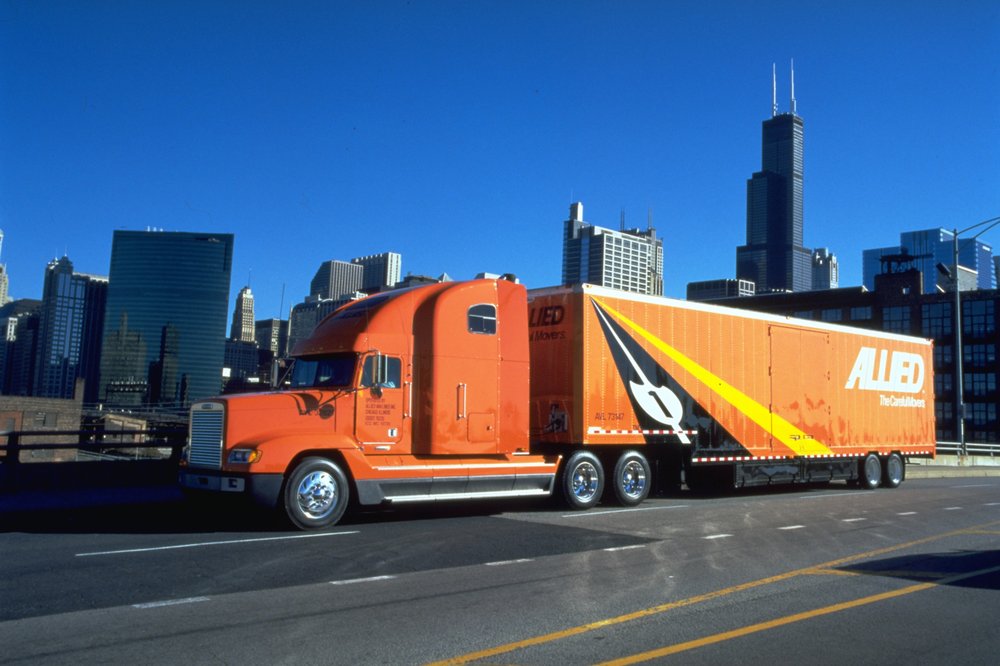
“Allied Van Lines Dallas, Texas. Reviews …” from qqmoving.com and used with no modifications.
Founded in 1928, Allied Van Lines brings nearly a century of moving experience to every relocation they handle. Their unparalleled nationwide network features local agents in every state, ensuring consistent service quality whether you’re moving from Manhattan to Los Angeles or between small towns in the Midwest. This extensive network allows them to maintain strict quality standards while providing the personalized service of a local provider.
Allied particularly excels at corporate relocations and high-value moves requiring specialized attention. Their crews receive extensive training in proper handling of electronics, fine art, and antiques, with custom crating services available for particularly valuable or delicate items. For businesses relocating employees, their corporate services include comprehensive move management, temporary housing coordination, and detailed expense tracking for tax purposes.
U-Haul Moving Help — Budget-Friendly Option
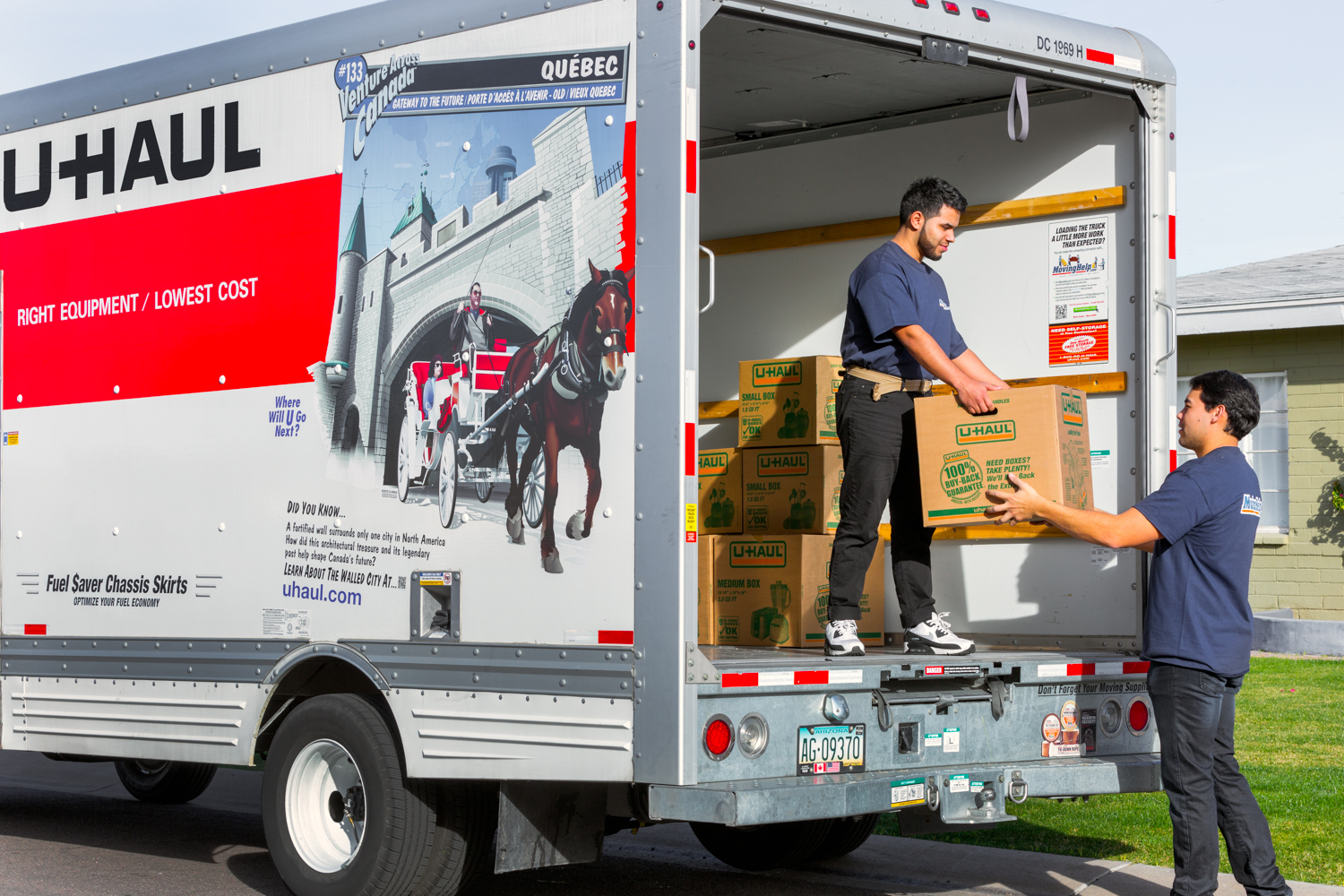
“MovingHelp.com Tops 1.5 Million …” from myuhaulstory.com and used with no modifications.
U-Haul Moving Help revolutionizes the DIY moving experience by combining affordable truck rentals with vetted professional labor. This hybrid approach allows budget-conscious consumers to significantly reduce costs while still getting professional assistance for the most physically demanding aspects of moving. Through their online marketplace, customers can browse profiles of local moving professionals, compare hourly rates (typically $45-$65 per mover), read verified reviews, and book help for loading, unloading, or both.
Gentle Giant Moving Co. — For High-Value Items

“Charlotte Moving Reviews | Gentle Giant …” from www.gentlegiant.com and used with no modifications.
When it comes to moving irreplaceable antiques, delicate artwork, or heavy specialty items like pianos and gun safes, Gentle Giant Moving Company stands in a class by itself. Founded by former professional athletes, this premium moving service specializes in challenging relocations that require extraordinary care, strength, and problem-solving abilities. Their crew members undergo a proprietary training program focused on proper lifting techniques, furniture protection, and navigating difficult spaces.
Gentle Giant’s white-glove service includes complimentary furniture placement, reassembly, and debris removal. Unlike standard movers who simply deliver boxes, their teams assist with detailed room setup according to your specifications. For valuable collections, they provide custom crating built on-site to the exact dimensions of each piece, ensuring maximum protection during transit.
Their pricing reflects their premium service level, typically running 20-30% higher than standard moving companies. For a local move involving a three-bedroom home, expect costs between $2,800-$3,500, while interstate relocations can range from $8,000-$12,000 depending on distance and special requirements. For clients with valuable possessions, their exceptional care and near-zero damage rate justify the premium investment.
Gentle Giant’s Specialized Services
- Custom Crating: On-site construction of wooden crates for art, antiques, and fragile items
- Piano Moving: Specialized equipment and techniques for safe piano transport
- Narrow Access Solutions: Expert handling of tight staircases, elevators, and doorways
- Fine Art Handling: Climate-controlled vehicles and museum-quality packing materials
- Storage Solutions: Climate-controlled, secured facilities with inventory management
College Hunks Hauling Junk & Moving — Eco-Friendly Choice
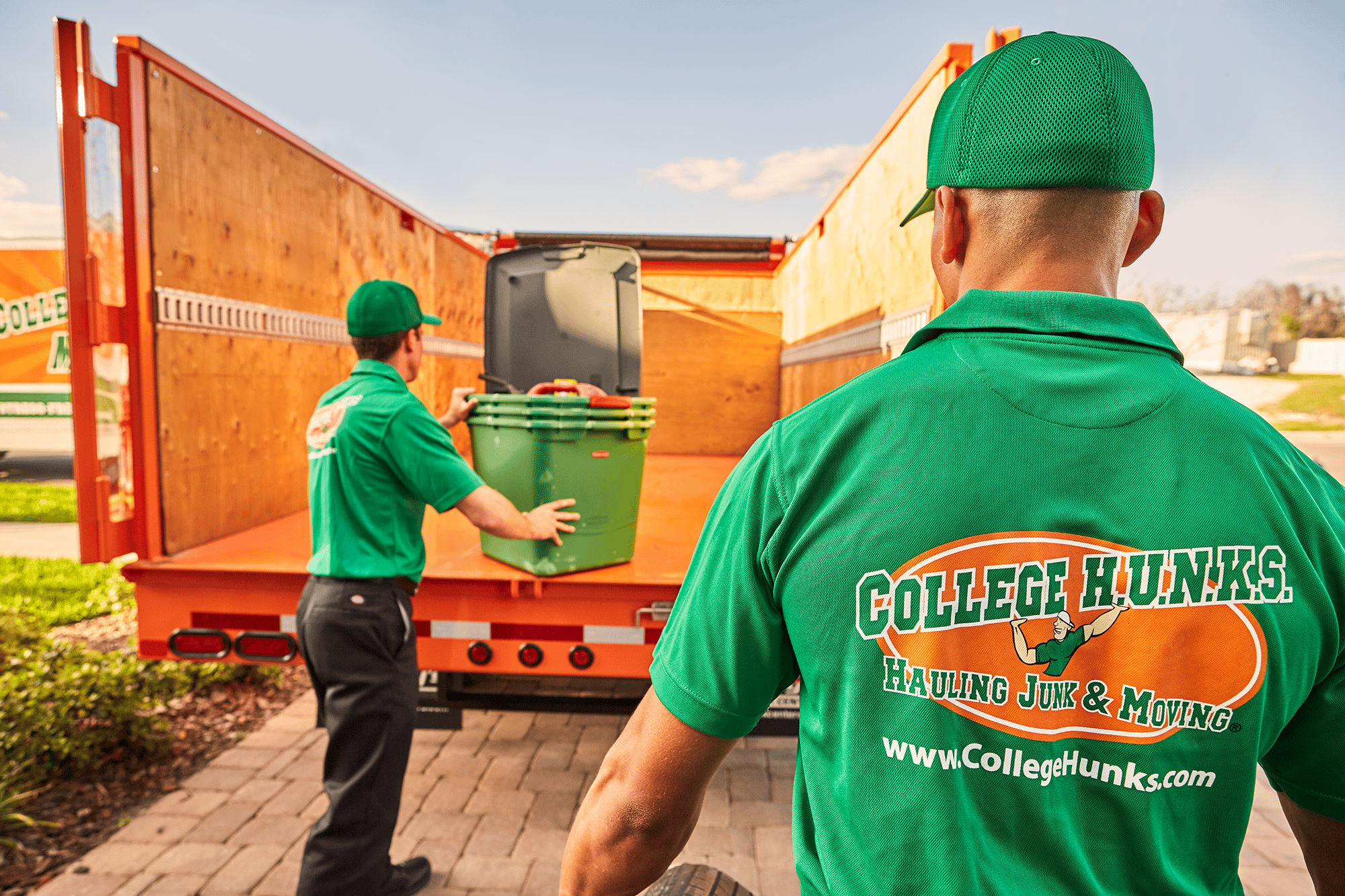
“College Hunks Hauling Junk & Moving Review” from www.thisoldhouse.com and used with no modifications.
College Hunks Hauling Junk & Moving stands out in the moving landscape by combining reliable relocation services with exceptional environmental consciousness. Their carbon-neutral moving operations utilize biodiesel trucks and comprehensive recycling programs that divert up to 70% of unwanted items from landfills. For environmentally conscious consumers, their donation coordination service identifies items that can benefit local charities rather than being discarded.
Their pricing structure falls midrange, typically $300-$1,200 for local moves depending on size and complexity. What makes College Hunks particularly appealing is their simplified booking process with transparent hourly rates for local moves and their commitment to on-time service, backed by a satisfaction guarantee. Their crews consist primarily of college students and recent graduates who bring energy and enthusiasm to what could otherwise be a stressful day.
While primarily focused on local and regional moves, College Hunks also offers specialty services including furniture delivery, storage solutions, and complete junk removal packages that can be bundled with moving services. This comprehensive approach makes them particularly valuable for downsizing seniors or those needing to declutter before relocating.
Moving.com Network — Best Comparison Tool
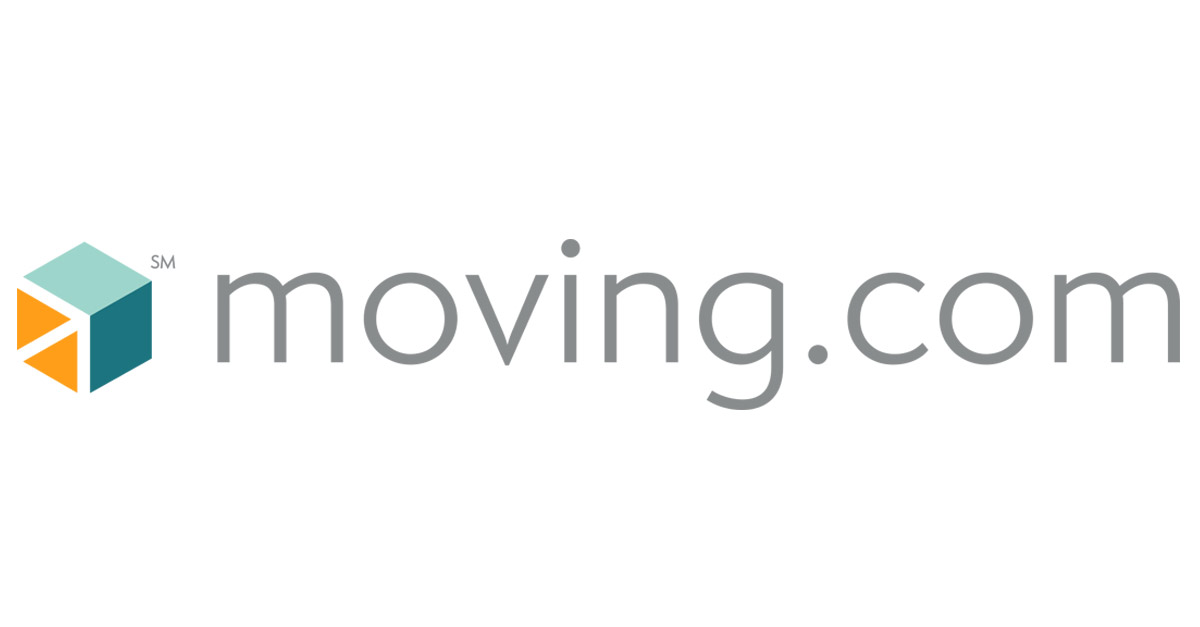
“Moving Services – Local & Long Distance …” from www.moving.com and used with no modifications.
Rather than a moving company itself, Moving.com Network operates as a vetted referral service connecting consumers with licensed, insured local moving companies. Their platform allows you to enter your ZIP code and moving details once, then receive matched quotes from 3-5 pre-screened movers serving your area. This service eliminates hours of research while ensuring you only deal with legitimate companies.
The network maintains strict standards for participating companies, requiring proper licensing, insurance verification, and positive customer feedback histories. Companies with unresolved BBB complaints or frequent negative reviews are removed from the network. For consumers, the service is completely free to use, as moving companies pay to participate only when they secure business through the platform.
What makes Moving.com Network particularly valuable is their accountability system – they follow up after moves to verify customer satisfaction and maintain quality control within their network. This ongoing feedback loop helps maintain service standards and provides consumers with confidence in their recommendations.
5 Red Flags That Signal a Rogue Mover
While reputable moving companies operate with transparency and professionalism, the industry unfortunately still harbors deceptive operators looking to take advantage of unsuspecting customers. Learning to recognize these warning signs can save you thousands of dollars and countless headaches.
Missing Credentials and Documentation
Legitimate moving companies readily provide their USDOT number, state licensing information, and physical business address upon request. Be immediately suspicious of any company that operates exclusively through a cell phone number or generic email address without providing proper business documentation. Reputable movers maintain websites listing their credentials, insurance certificates, and local business registrations.
When a company can’t produce basic business verification or claims they “don’t need licenses for local moves,” consider this a serious red flag. Every legitimate moving company maintains appropriate registration based on their operational area. Additionally, if a company operates under multiple business names or frequently changes their company identity, they’re likely attempting to escape negative reviews or regulatory oversight. For those dealing with companies trying to avoid negative reviews, it’s crucial to conduct thorough research and verify their credentials.
Suspicious Payment Demands
Beware of movers requiring large cash deposits exceeding 10% of your estimated move cost. Reputable companies typically request modest deposits to secure your move date, with the balance due upon delivery. Any demand for full payment upfront virtually guarantees problems down the line, as the company loses all incentive to complete your move satisfactorily once they have your money.
Similarly, companies that refuse credit card payments or insist on cash-only transactions are attempting to avoid paper trails and chargeback protections. Legitimate moving businesses accept multiple payment methods and provide detailed receipts for all transactions. They also clearly explain when payments are due and what payment forms they accept during the initial quoting process.
For those concerned about their financial standing, exploring credit repair services can be beneficial.
Price Quotes Too Good to Be True
When a moving estimate comes in drastically lower than competitors—particularly 30-50% below other quotes—prepare for a bait-and-switch situation. Dishonest movers deliberately underquote to secure your business, then reveal additional charges once your belongings are loaded on their truck. Common tactics include sudden fees for stairs, long carries, packing materials, or “heavy” items that weren’t mentioned in the initial estimate.
Professional moving companies base their quotes on careful assessment of your specific situation, accounting for factors like distance, inventory weight, special handling requirements, and access challenges. Their estimates include detailed line items explaining each cost component. If a company provides a vague, unusually low estimate without a thorough assessment, they’re setting the stage for price gouging later.
Refusal to Provide Written Estimates
Never proceed with a moving company that refuses to provide a detailed written estimate. Verbal agreements offer zero protection when disputes arise, and legitimate movers always document their pricing and services in writing. A proper written estimate includes inventory lists, service details, insurance coverage, delivery timeframes, and all applicable charges.
The most dangerous scenario involves movers who load your belongings without providing written terms, then demand additional payment before unloading at your destination. This hostage freight situation leaves consumers with little recourse, as their possessions are effectively held ransom. Protect yourself by insisting on comprehensive written documentation before any work begins.
How to Report Moving Scams
If you encounter a fraudulent mover or fall victim to moving fraud, report them immediately to help protect others and potentially recover your losses. File a complaint with the FMCSA through their National Consumer Complaint Database at https://nccdb.fmcsa.dot.gov for interstate moves. For local moves, contact your state consumer protection office and attorney general’s office.
Document everything by taking photos of damaged items, saving all communications with the mover, and keeping detailed notes about your experience. File reports with the Better Business Bureau and leave detailed reviews on Google and specialized moving review sites to warn other consumers. In cases of theft or hostage loads, contact local police in both origin and destination locations to file reports.
For severe cases involving significant financial loss, consult with an attorney specializing in consumer protection to explore legal options for recovering damages. Many states have enacted specific protections for moving consumers that allow for enhanced penalties against fraudulent operators.
How to Save 20-30% on Your Move
Moving doesn’t have to break the bank if you approach it strategically. With careful planning and informed choices, you can significantly reduce your moving costs without sacrificing service quality or adding unnecessary stress to your relocation.
Strategic Timing for Lower Rates
Moving company pricing follows predictable patterns based on demand fluctuations throughout the year and month. Peak moving season runs from May through September, with rates typically 20-30% higher than off-season moves. Similarly, most leases begin and end at month boundaries, making the last and first few days of each month significantly more expensive for moving services.
Schedule your move for mid-month and mid-week when possible to access lower rates and better availability. Tuesday through Thursday moves often cost less than weekend relocations. For even greater savings, consider moving during the October-April off-season when companies compete more aggressively for business and often offer promotional pricing to fill their schedules.
Decluttering Before Your Move
Since most long-distance moves are priced by weight, eliminating unnecessary items directly reduces your moving costs. Begin the decluttering process at least 6-8 weeks before your move date, systematically evaluating each possession. Items unused in the past year, duplicates, and things easily replaceable at your destination are prime candidates for selling, donating, or discarding.
For more tips on managing finances during a move, consider exploring the best IRS tax relief companies to help alleviate any financial burdens.
Host a garage sale or list valuable items on marketplace platforms to convert unwanted belongings into moving funds. For donations, schedule charity pickups to remove larger items without transportation hassle. Many moving companies report that customers could reduce their moving costs by 15-25% simply by eliminating items they don’t actually need or want in their new home.
DIY Packing vs. Professional Services
Professional packing services typically add $500-$1,500 to moving costs for an average three-bedroom home. While convenient, this service represents a significant expense that many consumers can eliminate by packing themselves. Start collecting free boxes from local retailers, liquor stores, and online marketplace groups about two months before moving day. Purchase only specialty items like dish packs, wardrobe boxes, and packing paper as needed.
Develop a systematic packing strategy working room by room, starting with seasonal items and rarely-used possessions. Label boxes clearly with contents and destination room to streamline unpacking. For valuable or fragile items, consider hybrid packing – handling standard items yourself while having professionals pack only delicate electronics, artwork, or breakables that require specialized materials and techniques.
Getting Multiple Quotes
Never accept your first moving quote without comparison shopping. Price variations between companies for identical services can exceed 25%, even among reputable providers. Use Moving.com’s ZIP code tool to request quotes from 3-5 licensed, insured companies serving your area, then compare not just bottom-line prices but service inclusions, insurance coverage, and estimate types.
When requesting quotes, provide identical information to each company to ensure valid comparisons. After receiving initial quotes, don’t hesitate to negotiate. Many moving companies have flexibility in their pricing, especially during slower periods. Mentioning competitive quotes often leads to improved offers or added services at no extra cost.
Remember that the lowest quote isn’t always the best value. Consider company reputation, insurance coverage, and service quality alongside pricing when making your final decision. A slightly higher quote from a consistently reliable company often proves less expensive than dealing with damages or delays from a budget operator.
Available Discounts You Should Ask For
Moving companies offer various discounts that are rarely advertised but readily available when requested. Military discounts typically range from 5-15% for active duty and veterans with proper identification. Senior citizen and AAA member discounts of 5-10% are common among national carriers, while off-season moves might qualify for promotional rates of 10-20% below standard pricing.
Corporate relocation programs through employers sometimes provide negotiated rates with specific moving companies, even for employees handling their own moves. First responders, teachers, and healthcare workers often qualify for professional courtesy discounts with many moving services. Always inquire about available discounts when requesting quotes, as companies rarely volunteer this information unless specifically asked.
Bundling services like packing, moving, and storage often triggers package discounts that reduce overall costs by 5-15%. For interstate moves, consider consolidated shipping options where your belongings share truck space with other customers moving along similar routes, reducing transportation costs by 15-30% in exchange for slightly longer delivery windows.
Find The Best Moving Companies 2026 Today
With proper research and preparation, finding a reliable, affordable moving company for your relocation is entirely achievable. The key is starting early—ideally 8-12 weeks before your desired move date—to ensure sufficient time for research, comparisons, and booking with your preferred provider.
Compare Quotes from Vetted Companies
Begin your search by gathering quotes from multiple pre-screened, licensed moving companies serving your area. Moving.com’s free comparison tool simplifies this process by matching you with appropriate providers based on your specific move parameters. Rather than contacting dozens of companies individually, this streamlined approach delivers qualified options directly to you.
When comparing quotes, look beyond the bottom-line price to understand what’s actually included. Some companies bundle services like furniture disassembly/reassembly and basic insurance in their standard rates, while others list these as add-ons. Evaluate cancellation policies, deposit requirements, and payment schedules alongside pricing to make truly informed comparisons.
What Information You’ll Need to Provide
To receive accurate moving quotes, prepare detailed information about your relocation before contacting companies. Essential details include your current and destination addresses with any access restrictions like stairs, elevators, or parking limitations. Create a preliminary inventory of large furniture pieces, appliances, and specialty items requiring special handling like pianos, gun safes, or artwork.
Be prepared to discuss your preferred moving dates, including flexibility options that might qualify you for lower rates. Most companies will ask about additional services you’re considering, such as packing assistance, storage needs, or specialty crating for valuable items. The more specific information you provide during initial consultations, the more accurate your quotes will be.
Next Steps After Getting Quotes
After receiving and comparing multiple quotes, schedule in-home or virtual video assessments with your top 2-3 choices. These detailed evaluations allow estimators to provide more precise pricing based on actual inventory rather than generalizations. During these appointments, assess the professionalism of company representatives, their willingness to answer questions, and their attention to detail.
Once you’ve selected your preferred provider, request a detailed written contract specifying all services, charges, insurance coverage, and delivery timeframes. Review this document carefully before signing, paying particular attention to cancellation policies, liability limitations, and payment terms. Make note of your dedicated contact person for questions that arise before moving day.
Finalize your booking by providing the required deposit and confirming key dates in writing. Request confirmation of your booking, crew size, and arrival window for moving day. Most reputable companies will contact you 24-48 hours before your scheduled move to confirm final details and address any last-minute questions.
Frequently Asked Questions
As you plan your move, and try to find the best moving companies 2026, you likely have questions about costs, timing, and services. Here are straightforward answers to the most common moving questions we receive from consumers.
How Much Do Local Moves Cost?
Local moving costs typically range from $200-$1,200 for a studio or one-bedroom apartment, covering 2-4 hours of professional labor plus truck rental. Larger homes require more time and larger crews, with three-bedroom homes averaging $800-$1,700 and five-bedroom homes ranging from $1,400-$3,000 depending on volume and location. Most local movers charge hourly rates between $100-$250 per hour for a standard crew, with additional fees for specialty items or access challenges.
For those looking to manage their finances during a move, exploring debt settlement options might be beneficial.
Factors significantly impacting local moving costs include stair carries (typically $50-$75 per flight), long carries from parking to residence (often charged after 75-100 feet), and heavy item fees for pianos, safes, or exercise equipment. Metropolitan areas generally command higher rates than suburban or rural locations, with premium markets like New York, San Francisco, and Boston averaging 30-40% above national averages.
What’s the Price Range for Long-Distance Moves?
Long-distance and interstate moves typically range from $2,800-$7,000 for a two or three-bedroom home moving 1,000+ miles. These moves are generally priced by weight and distance rather than hourly rates. A studio apartment moving cross-country might cost $1,800-$3,000, while a four-bedroom home could range from $6,500-$12,000 depending on inventory weight and specific services required.
What Insurance Options Do Moving Companies Offer?
By federal regulation, all interstate movers must offer basic valuation coverage of $0.60 per pound per article at no additional charge. This minimal protection means a 50-pound TV valued at $1,000 would only be covered for $30 if damaged. For adequate protection, consumers should consider full-value protection options where movers are responsible for the replacement value of damaged items or their repair.
| Insurance Type | Coverage Level | Typical Cost | Best For |
|---|---|---|---|
| Released Value Protection | $0.60 per pound per item | Included free | Budget moves with few valuables |
| Full Value Protection | Repair or replacement cost | 1-2% of declared value | Most household moves |
| Third-Party Insurance | Declared item values | $1.25-$2.00 per $1,000 value | High-value collections, antiques |
For valuable collections, artwork, or antiques, consider supplemental third-party moving insurance from companies specializing in relocation coverage. These policies typically offer more comprehensive protection with fewer exclusions than mover-provided options. Some homeowners and renters insurance policies also provide limited coverage during moves, so check your existing policy before purchasing additional protection.
If you’re looking for more information on credit repair services, be sure to explore your options thoroughly.
When selecting insurance coverage, carefully review policy exclusions and claim filing procedures. Most policies require damage to be noted at delivery, so inspect items thoroughly before signing the delivery receipt. Claims typically must be filed within 9 months of delivery for interstate moves, though timeframes vary for local relocations.
When Should I Book My Moving Company?
For summer moves during peak season (May-September), book your moving company 8-12 weeks in advance to secure your preferred dates and best pricing. Winter relocations offer more flexibility, generally requiring 4-6 weeks’ notice for standard moves. Corporate relocations, large households, and specialty moves involving pianos or valuable collections should add 2-4 weeks to these timeframes to ensure appropriate equipment and specialized crews are available.
Can I Mix DIY Moving with Professional Help?
Hybrid moving approaches combining DIY elements with professional services have become increasingly popular as consumers seek to balance cost savings with convenience. Services like U-Haul Moving Help and College Hunks’ labor-only options allow you to hire professional movers for the most physically demanding aspects of your relocation while handling other portions yourself.
Common hybrid approaches include renting your own truck but hiring professional loaders and unloaders by the hour ($45-$65 per mover-hour). This eliminates the most physically demanding aspects of moving while maintaining control over transportation. Another popular option involves self-packing but hiring professionals for transportation and heavy lifting, reducing costs by approximately 15-25% compared to full-service moves.
For interstate moves, consider portable storage containers from companies like PODS or U-Pack ReloCubes. These services deliver containers to your current home, allow you to pack at your convenience, then transport your loaded container to your destination. This approach eliminates tight scheduling pressures while still providing professional transportation for your belongings.
When designing a hybrid moving approach, realistically assess your physical capabilities, time constraints, and budget priorities. Loading and unloading are the most physically demanding and injury-prone aspects of moving, making them ideal candidates for professional assistance even in budget-conscious relocations.
Quick Cost Comparison: Full-Service vs. Hybrid vs. DIY
- Full-Service Move: $2,800-$7,000 for long-distance (professional packing, loading, transport, unloading)
- Hybrid Approach: $1,400-$3,500 (self-packing, professional loading/transport/unloading)
- Complete DIY: $800-$2,000 (truck rental, equipment, supplies, plus your time and labor)
Your perfect moving solution likely combines elements from multiple approaches based on your specific circumstances, budget, and preferences. The most important factor is making an informed choice that balances cost considerations with practical limitations and stress management during your transition.


Join the Conversation